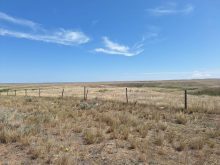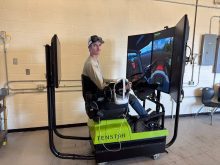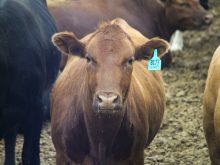“It was on the 1960s here in Ghent that we discovered molecular biology,”
MARC VAN MONTAGU
PROFESSOR, U OF GHENT
Canadian growers of flax and canola are well aware that most Europeans are not keen on biotechnology in agriculture. But if you’re looking for exceptions, this city in Flanders in the northern region of Belgium would be a good place to start.
The ancient town centre, currently undergoing massive restoration, is one of the most beautiful in Europe, made even more so by a profusion of flowers everywhere. The cool, moist climate here makes it ideal for growing flowers, which are a huge commercial business here.
Read Also

Farming Smarter receives financial boost from Alberta government for potato research
Farming Smarter near Lethbridge got a boost to its research equipment, thanks to the Alberta government’s increase in funding for research associations.
When an international group of farm journalists visited here in April, we were able to tour Floralies, the world’s largest indoor flower show. If you buy an azalea at Christmas, odds are that it came from one of the 200 growers in this area.
On the town’s outskirts, you’ll find the greenhouses where hundreds of new azalea crosses are tested every year. That’s done by conventional methods, and as in cereal crop breeding, it can be up to 10 years before a new variety is proven and available for market.
But in neighbouring labs and greenhouses you’ll also find scientists working for some of the biggest companies in field crop biotech, including BASF and Bayer CropScience.
“It was on the 1960s here in Ghent that we discovered molecular biology,” says professor Marc Van Montagu of the University of Ghent, who is known here as “the founding father of crop biotech.”
He says that the first herbicide-and insect-tolerant GM traits were developed by the company Plant Genetic Systems here in this city which has been dubbed “the cradle of crop biotech.”
Van Montagu is a vigorous proponent of GM technology, but says scientists have not done a good job of explaining its benefits. Asked what’s needed to convince a suspicious public, Van Montagu says scientists have to get out of the labs and learn how to talk to society.
“It is up to us to find the examples. We have to find the words. We are so complicated that everyone falls asleep before our sentences are finished.”
In response to suggestions that biotechnology has allowed the concentration of the seed business into too few large players, Van Montagu says that’s simply a reflection of cost.
“No small or medium companies can do it (biotech development), no small countries can do it. That is why it is done by large companies.”
“Green biotech”
As for the criticism that biotech has so far failed to deliver on the promise of end-use traits other than herbicide and insect resistance, Van Montagu says many are at the prototype level. “We just have do do the practice.”
Representatives of BASF and Bayer are also optimistic about “green biotech” traits, such as drought tolerance, reduced need for fertilizer and new end-use characteristics. Marnix Peferoen of CropDesign, a BASF-owned company based in Ghent, noted the recent European Union approval of a potato variety producing starch for industrial use, the first EU crop biotech approval in 10 years. He said a drought-tolerant corn is expected to hit the market in 2012.
Michael Metzlaff of Bayer CropScience, which has more than 300 employees at its Ghent facility, said that he expects future research will be a 50-50 split between work on crop protection and green biotech traits.
Government support
René Custers of Flanders Institute for Biotechnology (BIV) says that about two-thirds of the research the Belgian government-funded institute is on biomedical applications, but there is a crop component including a project to develop high-yielding poplar for biofuel.
BIV also has a public outreach role to the European public, including educational material for schools promoting the technology, including the safety of biotech crops.
Marc De Loose of the Institute of Agricultural and Fisheries Research says the Flemish government’s position on biotech crops is that no socio-economic aspects be involved in their approval.
“It’s up to the farmer’s decision. GM growth must be possible in all of Europe.”
That position was also supported in a later session with Piet Vanthemsche, president of Belgian farmers union. “I think it’s a big mistake in Europe not to use biotechnology.”
As for the EU’s zero-tolerance policy on GM, which is responsible for the shut-down of Canadian flax imports, Van Montagu makes his position clear.
“This zero tolerance is the biggest absurdity you can imagine.”














